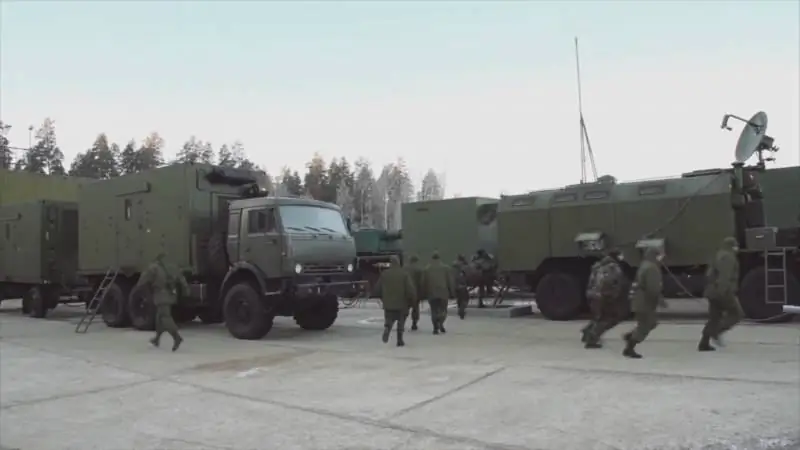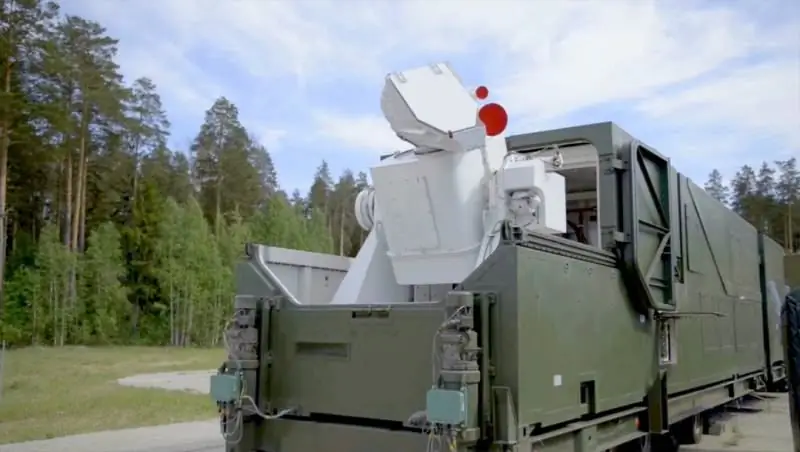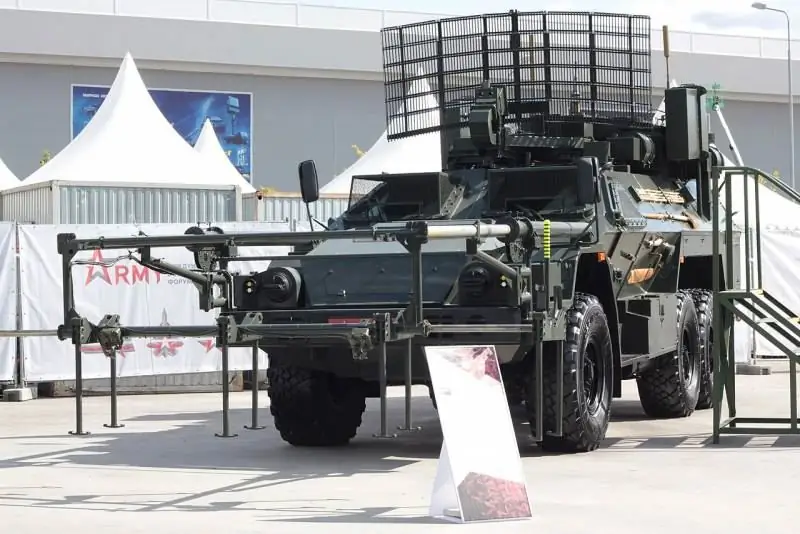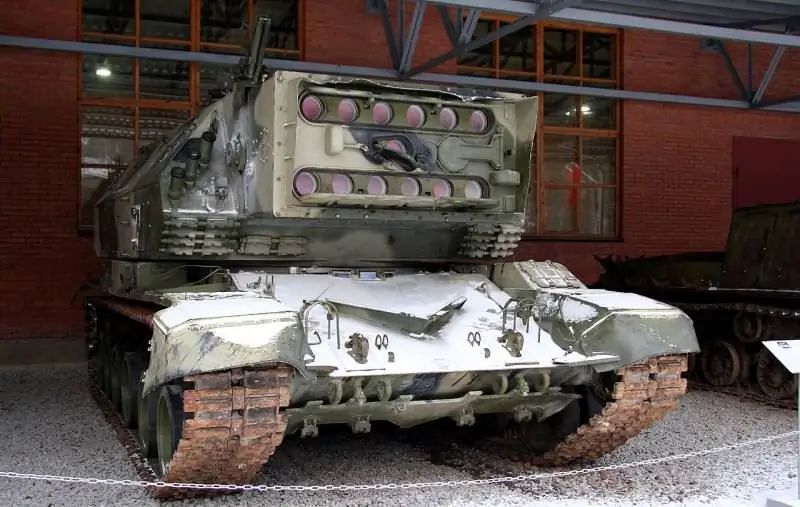- Author Matthew Elmers [email protected].
- Public 2023-12-16 21:49.
- Last modified 2025-01-24 09:17.

Leading countries are looking for technologies to create fundamentally new types of weapons. In our country, similar systems are also being developed, designated as "weapons based on new physical principles" (ONFP). One of these models has already been put into service and is on alert. In the foreseeable future, new systems of the same or another kind are expected to appear.
In an atmosphere of secrecy
In view of their special importance for defense, ONFPs are created in an atmosphere of secrecy. Official reports of such developments are extremely rare and have a very limited volume. However, almost all such news are of great interest.
Back in March 2018, the development of a mobile laser combat complex was announced. Subsequently, this product was named "Peresvet" and was put into service. At the end of 2019, the new type of complexes took up combat duty. Details of their operation were not disclosed.
In December last year, Deputy Defense Minister Alexei Krivoruchko, in an interview for Krasnaya Zvezda, revealed new information about the current work progress. According to him, new laser systems are being developed designed to destroy enemy optoelectronic systems and unmanned aerial vehicles. Combat lasers are integrated with armored vehicles' weapons systems.

Also, a promising "radio frequency complex" is being developed, designed to defeat enemy drones. It must inflict "functional damage", which does not mean an electronic warfare system, but a full-fledged "electromagnetic gun".
The military department sees and understands the capabilities and advantages of the DNFP, and it is proposed to pay close attention to this area. In early May, Deputy Prime Minister Yuri Borisov said in an interview for Interfax that weapons based on new principles in the near future will become one of the priority areas - along with hypersonic systems, robotics and precision weapons. The development of the ONFP will be provided for in the future State Armaments Program, which starts in 2024 and will be carried out until 2033.
Laser direction
The greatest successes among all types of ONFP at the moment are shown by combat lasers. Systems of this class were developed back in Soviet times, and in the recent past, new projects have been implemented. One of them has already been revealed and shown publicly, while others are only mentioned in the most general terms.

Since 2017, Peresvet complexes have been supplied to certain units of the armed forces for testing. Later, such products took up full combat duty. Detailed information about the deployment of combat lasers, their affiliation and the range of tasks to be solved were not officially disclosed. According to various estimates, such complexes can be used to combat aircraft, precision weapons or satellites of a potential enemy. Depending on the type of target, the laser can destroy its structure or disable the optical means.
According to the foreign press, "Peresveta" was previously present only on the territory of Russia. Last year, domestic media reported that such equipment was deployed in Syria in May 2020. The details of this operation were not specified. If such information is true, arguments appear in favor of one of the versions about the purpose of the complex.
The anti-aircraft capabilities of the Peresvet product are still in question, while the goals and objectives of other systems under development have already been determined. New laser air defense systems are already being designed, capable of fighting, at least with UAVs. Probably, upon completion of development, they will also be presented to the public.

Electromagnetic perspective
To date, the domestic industry has shown great progress in the field of electronic warfare, suppressing enemy equipment. In addition, it is known about work in the direction of electromagnetic weapons - systems that affect electronics in the most radical way.
Several years ago, a project with the code "Alabuga" was actively discussed. According to known data, it was a research work aimed at finding basic solutions and concepts in the field of electromagnetic weapons. Later it was reported about the development of a full-fledged pulsed explosive magnetic generator, suitable for use on various carriers.
According to popular versions, the EMP equipment of the "Alabuga" system will be installed on missiles with suitable characteristics. Their task will be to deliver a generator to a given area, followed by detonation and the formation of an impulse that strikes the enemy's radio-electronic means. However, there is no confirmation of such information. Moreover, they did not even officially announce the transition from the R&D stage to R&D.
Since 2015, an electromagnetic "gun" has been tested - a means for destroying enemy electronics. Last year, it was reported that an experimental sample of such a product confidently incapacitates ground and air targets at ranges of up to 10 km. A high level of other characteristics is shown.

It is important that the EMP cannon project is currently moving from experiments to the creation of a real model of weapons. The existence of such a project is already being talked about openly, although even its most basic features are not specified. Probably, last year's news about the tests allows us to imagine what the new electromagnetic combat complex will be and what it will be able to do.
It should be recalled that one of the samples of electromagnetic weapons has already entered service. The Strategic Missile Forces operates the Foliage remote mine clearance machine. One of the main assets on board is the so-called. microwave cannon, responsible for the destruction of electronic explosive devices. Practice shows that MDR "Foliage" fully meets the requirements, but the range of its equipment does not exceed several tens of meters.
Other new principles
Several years ago, it was reported about an experimental rail gun of domestic development. This product has been tested and collected the required data. According to unconfirmed reports, the work continues, but nothing is known about their results. However, a prolonged lack of information may indicate the continuation of research and development work - their results may be shown at any time.

Systems based on sound vibrations, geophysical, genetic and other weapon systems are also referred to the ONFP category. All these areas are not yet receiving sufficient attention in our country or abroad. Probably, projects of this kind will appear in the future, but their development is still a long way off.
Weapons for the future
To expand the capabilities and increase the combat effectiveness of the armed forces, it is necessary to develop weapons and equipment of existing classes, as well as to develop fundamentally new systems. It is these processes that can be observed at the present time in all leading countries. In the field of weapons, based on new physical principles, several directions are being worked out at the same time, while accents and priorities are set in accordance with the needs and capabilities of countries.
In our country, special attention is paid to combat lasers. Weapons of this class have been brought to combat duty, and new models are being created. All types of electronic systems are also actively developing, including those that hit the target with an impulse. Work in other directions, if any, is carried out at a slower pace.
At the same time, it is obvious that the Russian army and industry as a whole are showing great interest in the topic of the ONFP. The most realistic projects and proposals are supported and developed. And due to such measures, a serious scientific and technical reserve is created for future rearmament and increasing combat effectiveness.






